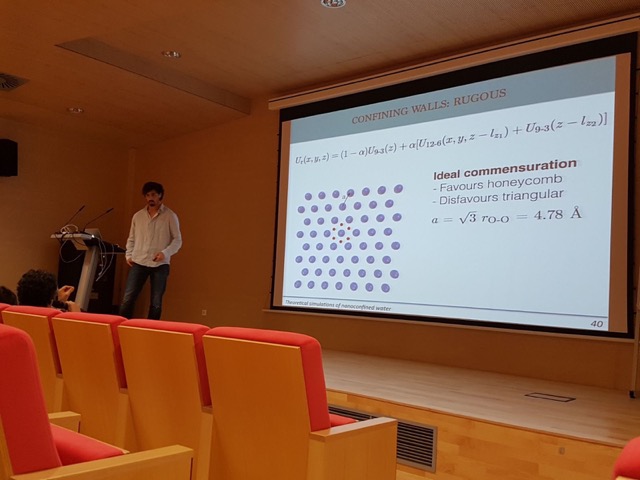Theoretical Simulations of Nanoconfined Water
Jon Zubeltzu, Pre-doctoral Researcher at the Theory Group at CIC nanoGUNE, received his PhD at the University of the Basque Country (UPV/EHU) after the defense of his thesis project on 5 June 2017. His research work, entitled “Theoretical Simulations of Nanoconfined Water", has been developed under the supervision of Prof. Emilio Artacho, Theory group leader.
An international committee including leading researchers in the field was selected to assess the research project:
- Dr. Ronen Zangi (UPV/EHU / Ikerbasque)
- Dra. Marivi Fernández-Serra (Stony Brook University)
- Dr. Giancarlo Franzese (IN2UB-Universitat de Barcelona)
The defense consisted of a presentation by the candidate on the main aspects of the Ph.D. thesis project followed by an extended discussion based upon the questions that each one of the members of the committee raised in relation to the research work that has been carried out by Jon Zubeltzu during his PhD studies. After its final deliberation, the committee decided to award the candidate the Doctor Degree with the highest mention existing at UPV/EHU (cum laude).

After the defense, we asked Dr. Jon Zubeltzu to explain us a bit more about his project:
Which was the subject of your thesis?
The aim of my thesis was to study the properties of two-dimensionally confined water by computer simulations. Liquid water is not only of obvious importance but also extremely intriguing, displaying many anomalies that still challenge our understanding of such an a priori simple system. The same is true when looking at nanoconfined water: The liquid between constituents in a cell is confined to such dimensions, and there is already evidence that such water can behave very differently from its bulk counterpart.
Why did you choose this subject?
In the Theory group, we mainly do simulations (computational experiments) and coding, and I had the clear idea that I wanted to spend most of the time carrying out simulations of physical systems. One of the possibilities was the study of water, which Emilio (my supervisor) already started years ago. My first idea about water was that almost everything was known, but this is not the case, and the fact that such a common and important substance had so many unknowns was very exciting and motivating.
Which metodology/techniques did you use?
By computational simulation, is the same as doing experiments but in the computer. Part of the thesis was based on Classical Molecular Dynamics simulations, in which the particles are considered as classical point particles and their dynamics follow Newton's second Law. The other part of the work is based on Density Functional Theory calculations, in which the electrons are considered Quantum Mechanically.
Which have been the main conclusions?
We have observed that strongly confined water shows a region in the phase diagram in which the oxygen and hydrogen atoms decouple, behaving like a simple monoatomic fluid. This behaviour is very unusual in water, characterized by behaving like a strongly complex fluid, and has strong influences (which we characterize) in the global behaviour of the fluid under confinement.
What could be the contribution of your research for present or future nanotechnologies?
Our work has had implications in the knowledge of water, although in the future it can have nanotechnological applications, right now this is far, as we still do not understand water itself.
How do you feel now that you have finished the thesis? Which are your plans for the future?
For the moment, I don't want to continue in the scientific world, my intention is to become a teacher in high school or in university. After finishing my PhD I had the clear idea that I wanted to relax and enjoy the free time, which right now I am still doing.
